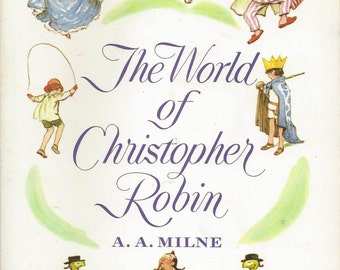
I can’t think of one more easily absorbed and enjoyed than “Disobedience”, nor one that captures so perfectly this childhood terror. Milne’s are probably the last poems written that really cry out to be memorised and recited. His study of classics and his work on Punch had given him the extraordinary ease and range he shows in the poems. His peerless dialogue has its roots in his playwriting career. It’s good to be reminded of just how long and demanding an apprenticeship he had served before he discovered Pooh. Milne carved out his career in the suave, seductive world of London’s clubs in the 1920s and the green rooms of Shaftesbury Avenue. The tragedy of Milne’s success is that it trapped a real child in time like a fly in amber

The overarching drama of the Sherlock Holmes stories is the great detective’s struggle, not with Moriarty, but with his creator’s attempts to kill him off. You could say his friend and hero JM Barrie wrote with great commercial success after Peter Pan, but what does “after Peter Pan” mean? Peter Pan was, is and always will be Barrie’s other works are of their time. Milne isn’t of course the only writer to find himself swallowed up by his own creation. They wanted to see the bear and – more troublingly – the boy. He gets to hear the audience call “Author! Author!” No one did that at Pooh events. Milne had a long, successful career in the theatre – a world in which the writer becomes accustomed to a certain amount of petting and caressing. Frankenstein was so eclipsed by his own creation that it has robbed him of his name. Watch the official trailer for Goodbye Christopher Robin Milne’s life story brilliantly illuminates what it feels like to be tested by huge, unlooked-for success. Failure at least has the comfort of hope. You want to move on but your global hit exerts all the gravity of a planet and you are trapped in its orbit.

You want to be Hamlet but you’re hailed as a clown, and now you can never be any kind of Hamlet.

One of the great secrets of success is that, more often than not, it is not the kind of success you were hoping for. Pooh is one of a tiny handful of creations that are so enormously successful we forget the infelicity of their names: Boots, the Beatles, Star Wars, Winnie-the-Pooh. A s Quentin Crisp once pointed out in a lecture: if he were to bring a distinguished old Yorkshireman on stage, the audience might be perplexed but if he brought a polished abstract sculpture with a hole in the middle, the audience would cry out, “Ah! Henry Moore!” So AA Milne’s long career as poet, playwright, polemicist, peace campaigner and novelist is completely eclipsed by four short children’s books which, as he put it in 1952, he created, “little thinking / All my years of pen-and-inking / Would be almost lost among / Those four trifles for the young”.


 0 kommentar(er)
0 kommentar(er)
